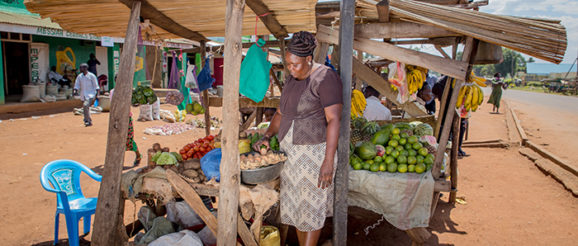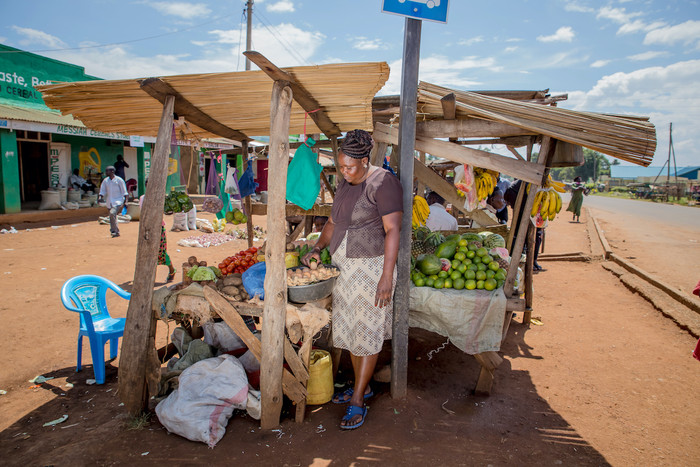A Race Against Time: Why We Need Innovation and Evidence to Address COVID-19’s Economic Impacts

The last few weeks have brought a slew of dire economic projections across the globe as a result of the spread of the coronavirus. In the World Bank’s baseline scenario, almost 24 million fewer people will escape poverty in 2020 due to the economic impact of the pandemic.
In his launch of the Report on the Socio-Economic Impacts of COVID-19, Antonio Guterres, UN Secretary-General, urged: “We must respond decisively, innovatively and together to suppress the spread of the virus and address the socio-economic devastation that COVID-19 is causing in all regions.”
But this is easier said than done. Innovation, as countries are perceived to be in the foreshadows of disaster, is a hard sell. But we must innovate and learn to ensure that we can drive to scale effective and contextually-appropriate policies. Several excellent articles and blogs in the past couple of weeks (here, here, and here) have highlighted that the calculus for containment efforts in developed countries is not the same as it is for less developed nations. The economic costs of containment are much starker for the poor and it is unclear that those efforts will produce intended results.
The calculus for containment efforts in developed countries is not the same as it is for less developed nations. The economic costs of containment are much starker for the poor and it is unclear that those efforts will produce intended results.
We are now in a race against time. Living in the US or Europe, we recognize the costs of policy action through social distancing and containment, as well as the fatal costs of inaction. But we now have the limited luxury of time until the virus spreads more aggressively across less developed countries. And it is at this time that we need to re-tool our policy prescriptions.
So where do we start? At IPA, we are shifting our focus to rapid data collection to provide policymakers with critical diagnostic data about the current situation in their countries, using behavioral insights and rapid A/B tests that can help to answer a number of questions that we are hearing from our government partners. These are the questions that they are grappling with as they enter this uncertain time.
We now have the limited luxury of time until the virus spreads more aggressively across less developed countries.
First, how to design effective social safety net policies. Ugo Gentilini’s living paper on social protection measures shows that there has been a surge in social protection programs across the globe in response to the virus spread. But while social assistance and more specifically cash-based programs are a go-to policy intervention, there remain a number of core operational questions of how to best get cash to people who need it, what targeting approach is most effective and cost-effective, whether to give large lumps sums or small, more frequent support, how to increase the use of digital payments, and whether to give cash to men or women in the households.
Second, how to reduce impacts on small businesses, particularly those run by women. Small and medium enterprises (SMEs) are the backbone of most economies, representing more than 90% of firms and more than 50% of employment and GDP worldwide. SMEs are particularly vulnerable to the impacts of the pandemic and its related mitigation strategies, on account of the drops in demand for goods and services and supply chain disruptions. Women-owned businesses are likely to bear a disproportionate brunt given that their owners will need to take on the additional burden of childcare and care of any sick members of the family.

Governments have so far enacted a wide range of policies to support SMEs and at-risk workers in weathering the storm. Common policies have been to delay tax payments, require flexible utility payments and refund value-added tax (VAT). Others have offered low-or-no interest loans with flexible terms or cash grants. These policies can help some SMEs and employees survive in the short term, however, given the rapidly changing context of the global pandemic, it is unclear how they can survive in the long term once these temporary measures dissipate.
Third, ensuring children are safe and able to learn. With millions of children impacted by school closures, Ministries of Education from Peru, to Zambia and the Philippines are assessing how to best establish distance learning programs, with sufficient support to both students and teachers. The Government of Rwanda is preparing teachers to facilitate distance learning during the crisis, but require more information on teachers’ ICT literacy and access before they can plan effectively. Peru and Ghana’s Ministries of Education are similarly deploying distance learning initiatives, and are wondering how to monitor the rollout so that they can ensure that resources are actually reaching children, that students are really learning, and that educators can make data-informed adjustments to their teaching plans as they switch to this new mode of teaching. All of our education partners are also wondering how best to support parents and caregivers during a stressful time of scarcity and uncertainty.
With millions of children impacted by school closures, Ministries of Education from Peru, to Zambia and the Philippines are assessing how to best establish distance learning programs, with sufficient support to both students and teachers.
Fourth, ensuring protection for vulnerable populations—the elderly, those affected by domestic violence and forcibly displaced populations. Countries around the world are seeing drastic and disturbing increases in reports of domestic abuse. Many countries are developing targeted policies to reduce domestic violence during this crisis, but need support with identifying high-risk populations and quickly testing the effectiveness of violence prevention programs as they are rolled out. In contexts impacted by forced displacement, especially in crowded refugee and IDP camps, it may not be possible for people to follow public health guidelines around handwashing and social distancing. Further, displaced populations are often ineligible for social safety net programs provided by states. Organizations responding to the crisis in displaced communities are thus tasked with not only continuing life-saving programs in the midst of a pandemic, but meeting the growing health, safety, and livelihoods needs of an already marginalized population.
IPA is launching a cross-country multi-sector panel survey to understand the economic and social ramifications of the 2020 pandemic, building trend data to help us better monitor the effects of new country-level policies across a range of outcomes. Bangladesh and Ghana are taking the lead in being the first countries to build a representative sample and launch this survey, and we expect to add Zambia, Sierra Leone, Cote d’Ivoire, and Burkina Faso in response to policymaker and funder demand. We are also working with a number of government and academic partners to test interventions that aim to will support the response effort, for example by testing the impact of integrating health modules into distance learning programs in the Philippines.
The reason we—and the international community—need to be investing in innovation is the same reason the Gates Foundation has committed billions of dollars to build factories to manufacture the top seven vaccination candidates for COVID-19, knowing full well that it will likely only be one of those factories that is needed for the production of the vaccine. The Gates Foundation is making a large investment, but the return on that investment will be huge in lives saved and they will also have saved time.
Our investments in innovation and research now will not only pay off for people immediately affected by the crisis but will also save us from the prolonged financial costs of pushing people further into poverty.
We have that same opportunity now in mitigating some of the most egregious social and economic effects that people will feel from COVID-19. Our investments in innovation and research now will not only pay off for people immediately affected by the crisis but will also save us from the prolonged financial costs of pushing people further into poverty.
